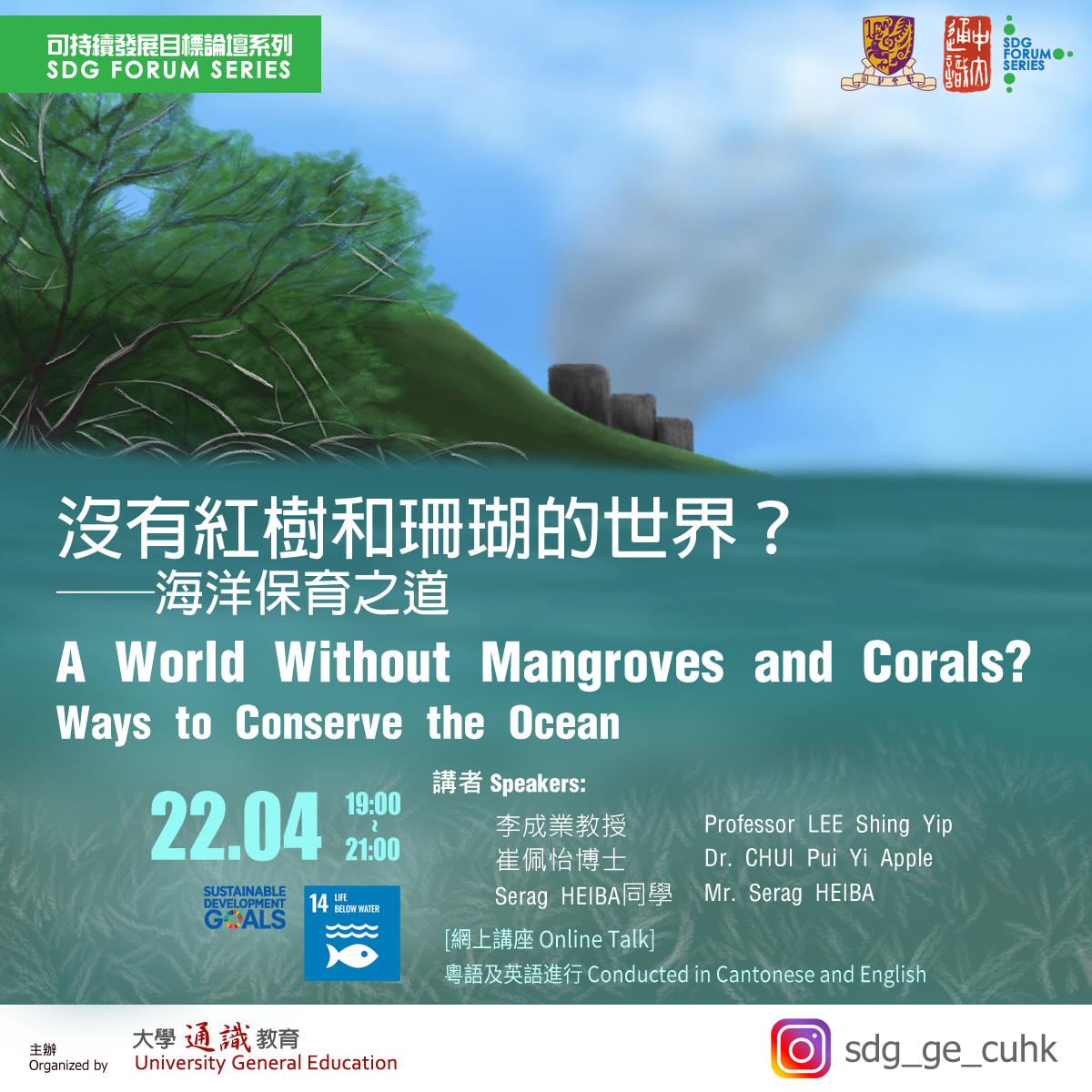Events
[SDG Forum Series 2.0] A World Without Mangroves and Corals? – Ways to Conserve the Ocean
22 Apr 2021
7 – 9 p.m.
The talk will be conducted with ZOOM. Link will be provided later.
Prof. LEE Shing Yip, Joe, Dr. CHUI Pui Yi, Apple, Mr. Serag HEIBA
Professor Shing Yip (Joe) Lee is the Director of the Simon F S Li Marine Science Laboratory and Director of the Institute of Environment, Energy and Sustainability of The Chinese University of Hong Kong. He completed a Ph.D. on the Mai Po Marshes during the tenure of the inaugural John Swire Scholarship in Wetland Ecology at The University of Hong Kong. After a short period as a Croucher Foundation Postdoctoral Fellow at the University of Wales, he taught at HKU for 8 years before moving to Griffith University, Australia. Joe joined CUHK in 2017. He is a Chartered Fellow of the Royal Society of Biology, and has been the chair of the IUCN Mangrove Specialist Group since its establishment in 2014. He has published more than 200 papers on various aspects of coastal marine science, with a focus on the ecology and carbon dynamics of mangrove ecosystems.
Dr. Apple Chui obtained her M.Phil. and Ph.D. degrees in Environmental Science and Biology programs from CUHK. She has been with the School of Life Sciences as a lecturer for 5 years before becoming a research assistant professor in 2021. She is a PEW marine fellow. Her research addresses two main questions: How will projected future climate change affect corals that are currently present in marginal coral environments like Hong Kong? And can coral chimerism be used as a tool to enhance the resilience of corals, and hence be used as one of the strategies for active coral restoration in the future. Apart from research, Dr. Chui has been actively engaged in public outreach and education activities on marine and coral conservation in Hong Kong. In 2019, she officially launched an outreach programme “Coral Academy”, to raise student and public’s awareness and inspire action in marine conservation through various workshops.
Serag Heiba is a second year undergraduate student studying Energy and Environmental Engineering at CUHK. As an Egyptian, his upbringing showed him the connection between a healthy environment and social justice. He now serves as the Hong Kong coordinator for a youth environmental organization named ThinkOcean and leads its CUHK chapter with the aim of raising environmental awareness on and off campus, advocating for sustainability through policy and other initiatives, and providing a platform for youth to become leaders who drive change in the 21st century.
Online reservation:
CUHK students and staff: https://webapp.itsc.cuhk.edu.hk/ras/restricted/event?id=46774
Public audience: https://cloud.itsc.cuhk.edu.hk/webform/view.php?id=12789469
Mangrove ecosystems support human well-being in a lot of aspects. Mangrove ecosystems not only are important natural defenses against the impacts of natural disasters and climate change but also help ensure food security and provide livelihoods for local communities. Moreover, mangrove forests provide habitat for thousands of species at all levels of marine and forest food webs. In particular, the health and extent of coral reefs are largely dependent on coastal mangrove forests. Without viable fisheries which thrive on a healthy mangrove ecosystem, coral reef cannot survive.
However, in the past century, 67% of global mangroves have been lost due to coastal development, climate change and agriculture. In the meanwhile, the health and extent of coral have taken a toll.
In this SDG Forum, we focus on the vision and implementation of SDG 14—to conserve and sustainably use the oceans, seas and marine resource for sustainable development and we have invited experts on mangrove and coral reef ecosystems to share with us the ways to protect, conserve, restore and sustainably manage these precious global resources.
Drawing examples from Hong Kong, China, and globally, Prof. Joe Lee will discuss the implications of the threats for mangrove ecosystem function and their services to coastal communities, and actions being taken to reverse this trend. Dr. Apple Chui will share with us the work of her research team to help restoring and safeguarding Hong Kong coral communities for future generations. Until recent years, her research team has for the first time successfully raised and out-planted laboratory-reared baby corals to assist in Hong Kong coral community restoration. Mr. Serag Heiba, an international student at CUHK, will discuss the role of individuals in tackling such global challenges and achieving the SDGs, and share his experience and lessons learned from working with youth environmental organizations such as ThinkOcean.
In Cantonese and English


